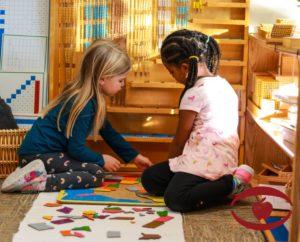
Is your child ready for school? You may wonder what kind of school best fits them. Should you send them to a traditional school or a Montessori school?
The choice shouldn’t be too difficult once you know the basics of each type of school. Explore a quick rundown of the differences between traditional schools and Montessori schools.
Active Vs. Passive Learning
In a traditional school, students are passive learners. They sit in rows and listen to the teacher lecture. In Montessori programs, students are active learners. They participate in hands-on activities and learn by doing.
By hands-on activities, children can touch, feel, and experience everything around them. They learn by doing rather than by listening to the teacher talk.
For example, a Montessori student might learn about the solar system by building a model. In a traditional school, students might learn about the solar system by listening to the teacher talk about it and looking at pictures in a textbook.
Active learning is usually more effective than passive learning. A study published by the National Institutes of Health found that students who were actively engaged in their learning were more likely to retain information and perform better on tests than those who passively listened to a lecture.
Teacher’s Role
In a traditional preschool classroom, the teacher is the authority figure. They are in charge of imparting knowledge to their students, and they’re supposed to do it in a particular order and pace.
In a Montessori school, the teacher is more of a facilitator. They provide materials and guidance but don’t dictate how or what their students learn. Students are free to explore and learn at their own pace.
For example, a Montessori teacher might provide their students with a set of blocks and some books about animals. The students are then free to build whatever they want and read whichever book interests them. In a traditional school, the teacher would likely give the students a list of instructions on what to build and which book to read.
This difference in the teacher’s role allows for more individualized instruction, leading to more engaged and excited students.
Grade Levels and Age Groups
Traditional schools follow chronological age-grouping. Students go into classes with other students the same age as them and move on to the next grade level together.
In a Montessori school, a child’s developmental range determines which class they go into. For example, a student who is ahead of their peers academically might go to a class with older students.
This difference is significant because it means that students in a Montessori school can learn with children of different ages. For example, a student who is eight years old but has the developmental level of a 12-year-old can go into a class with 12-year-olds.
Being in a class with students of different ages exposes your child to a broader range of perspectives. It also allows them to learn at their own pace, without being held back or pushed ahead by their peers.
Children With Special Needs
Montessori classrooms are typically more organized and less distracting than traditional preschool classrooms. This setting can significantly benefit children with ADHD or autism, who often thrive in environments with set schedules and fewer distractions.
Additionally, the Montessori philosophy of modeling behavior can be helpful for children with autism who may need assistance developing social skills. By observing and emulating their peers’ behavior, children with autism can learn how to interact effectively in social settings.
Ultimately, Montessori schools can provide a supportive and structured environment ideal for children with special needs.
Montessori School Is Better
So, what is the difference between Montessori and traditional schools? In a nutshell, it boils down to two things: active learning and individualized instruction. With its focus on these two areas, a Montessori school can lay the foundation for a lifetime of success.
If you want an alternative to traditional schooling this summer, Miniapple International Montessori School in Minnesota will be a good fit for your child. We offer a unique educational experience that’s fun, friendly, and diverse. Contact us today to schedule an onsite visit.

